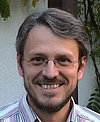Edgar W. Schneider, University of Regensburg

Edgar W. Schneider is Chair Professor of English Linguistics and currently Dean of the Philosophical Faculty at the University of Regensburg, Germany, after previous appointments in Bamberg, Georgia, and Berlin. He has written and edited several books (most recently Handbook of Varieties of English, Mouton 2004/2008, and Postcolonial English, CUP 2007) and published and lectured on all continents on the dialectology, sociolinguistics, history, semantics and varieties of English, and edits the scholarly journal English World-Wide and an associated book series.
Of ELFs and ESLs, and on how they get along with each other
The claim that lingua franca forms of English (ELFs) are somehow closely related to "World Englishes" has been argued for, most recently, for example, in symposium papers by Jenkins, Seidlhofer, Breiteneder and others published in World Englishes 2009. This paper sets out to critically explore the evidence for this claim, also by adding a psycholinguistic dimension. In a first part, I discuss the theoretical basis, i.e. the shared origin of both ELFs and ESLs in processes of second-language acquisition and the assumption that both might be shaped to some extent by the impact of fundamental cognitive principles of language organization. Secondly, some parallels between structural characteristics of ESLs and ELFs will be pointed out, both by pulling together some evidence from earlier studies on the issue and by searching for similarities in select corpora (including VOICE). Finally, I describe the methodology and results of a corpus-based research effort the aim of which it was to test the hypothesis that the cognitive principle of isomorphism (one-to-one matching of form and meaning) may manifest itself more strongly in New Englishes than in British English, the test case being finite and non-finite complement clause patterns. The question is raised whether such a principle is operational in ELF as well, and manifests itself also in ELF's stronger tendency to apply the "open choice" rather than the "idiom" principle in Sinclair's framework (as was suggested by Seidlhofer and Widdowson). In conclusion, it is argued that ELFs and ESLs are related indeed and do show substantial parallels which make sense in an evolutionary perspective.
